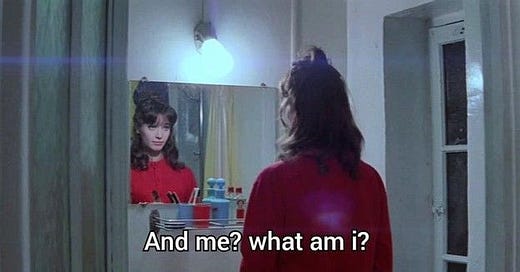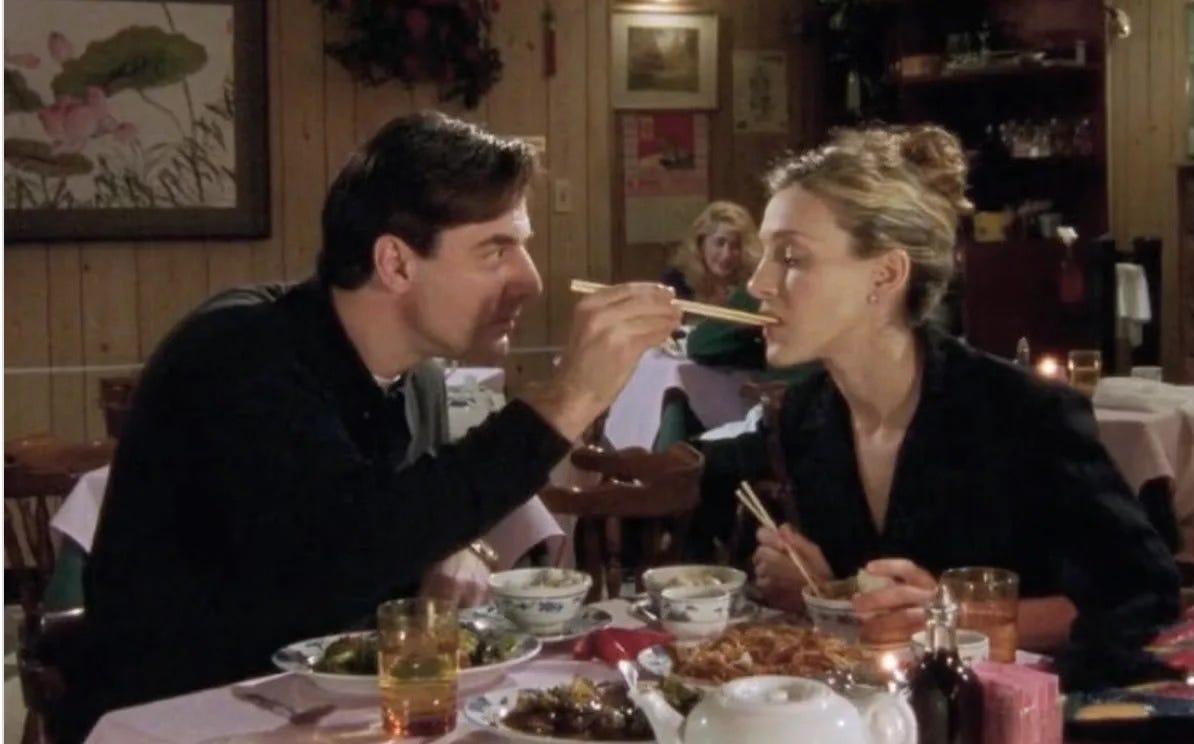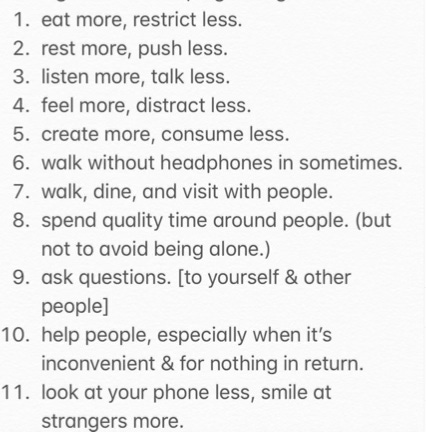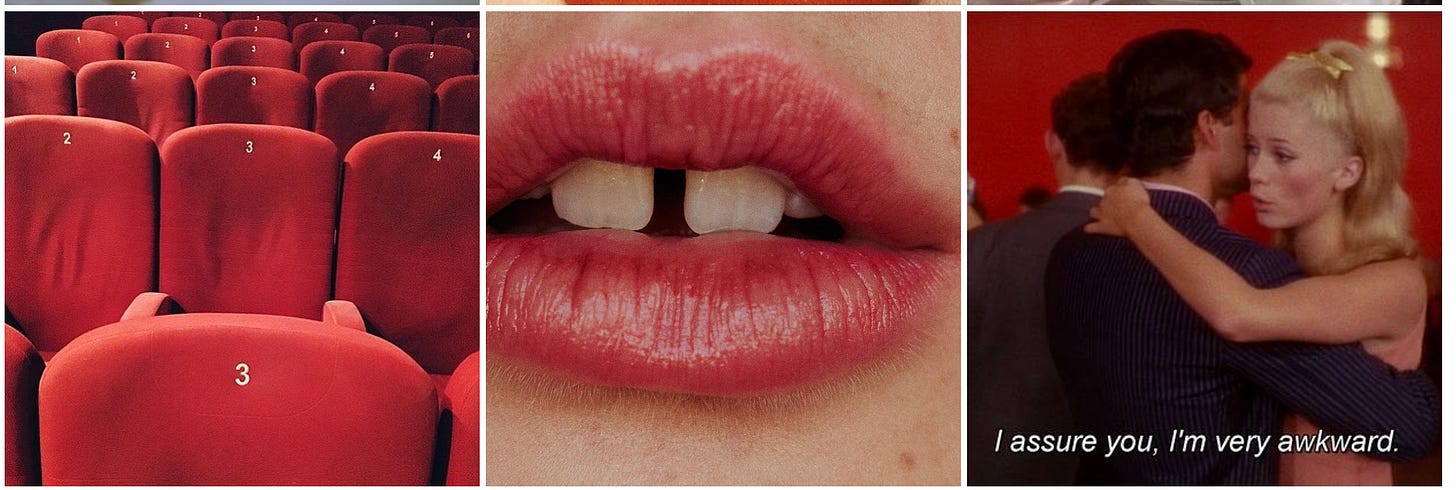Mirror, Mirror... Lessons on Vanity & Aging Learned the Hard Way
bodies heal & how to find humor in beauty standards.
The last dispatch took a while so, finally sharing it felt satisfying and gave way for new topic ideas. Rick Rubin says a project is done when you’re eager to work on something new. I’m ready to move on, but committed to finishing what I started, especially after reading the messages and comments, so this is a continuation.
One reader wrote how, despite being nearly 70, she still experiences disordered eating, showing how pervasive and amorphous this is. Most of us have degrees of insecurity about how we look, even those I’d never guess. Knowing I’m not alone in my frustrations with the impossible standards of beauty is comforting as well as learning that their roots are designed to keep us stuck in constant pursuit.
As Susan Sontag wrote in her 1972 essay “The Double Standard of Aging”:
“For women, only one standard of female beauty is sanctioned: the girl. The great advantage men have is that our culture allows two standards of male beauty: the boy and the man. The beauty of a boy resembles the beauty of a girl. In both sexes it is a fragile kind of beauty and flourishes naturally only in the early part of the life-cycle. Happily, men are able to accept themselves under another standard of good looks — heavier, rougher, more thickly built. A man does not grieve when he loses the smooth, unlined, hairless skin of a boy. For he has only exchanged one form of attractiveness for another: the darker skin of a man’s face, roughened by daily shaving, showing the marks of emotion and the normal lines of age. There is no equivalent of this second standard for women. The single standard of beauty for women dictates that they must go on having clear skin. Every wrinkle, every line, every gray hair, is a defeat. No wonder that no boy minds becoming a man, while even the passage from girlhood to early womanhood is experienced by many women as their downfall, for all women are trained to continue wanting to look like girls.”
Her words remind me that my attempts to uphold impossible standards are fruitless and funny. Despite knowing where they stem from, my knee-jerk reaction still is often to tear myself apart. I noticed my body image issues ramping up and that I’d been picking apart my physical appearance more than usual a few months ago. It was right after a romantic rejection where he’d told me he was seeing someone else, who was, well, younger. I have plenty of friends in incredible relationships with people decades younger or older so that’s not a judgment of age gaps—but I’d be lying if learning this information didn’t contribute to the fact that I started staring at my deep forehead lines a little longer or falling into some familiar controlling habits. And while I could recite Sontag’s words, this brand of rejection still led me down an anti-aging rabbit hole.
We are susceptible and the beauty and diet industries get us while we’re in a vulnerable state. So, to counteract that, I’m lingering on this wide-ranging topic to share the list I promised last time: all I’ve learned and found helpful on body image and beauty.
Of everything, the most useful strategy is actually: sharing. Doing so isn’t an act of altruism, but a method of healing. It could foster connection between you and whomever you share it with, but beyond that it could help relieve any shame you may feel. Brené Brown says,
“Shame can’t exist when it’s shared, it begins to dissipate.”
So thank you again for giving me a place, where I can tell on myself, and dissolve some shame.
Looking forward to your comments on this one and will compile them into a master list—perhaps even a zine?
Thanks,
KD
LIST 1: FOUND IN MY PHONE
It’s neda awareness week next week, so here’s a little list I found in my notes that I made about 8 years ago for it. It was to help me remember what I’d learned from recovery and still useful despite being a bit cheesy:
LIST 2: WHAT HELPS ME ON A BAD BODY IMAGE DAY
Make fun of this: Level with me, can we just have a laugh on how silly it all is? That we care so much on how we look when there are so many more important things to care about right now? But we do, I do, it affects us. Find a friend who makes you laugh, spend more time with them, than your mirror. Make people laugh, it makes you hotter.
Appreciate: Bodies heal. Skin grows back together. We demand our bodies to conform to beauty standards, meanwhile they’re just trying to digest our food, send white blood cells to our wounds, and scab the zit we picked. Try. to recognize the resilience of our bodies.
Change the things you choose: While I believe the above, I understand the desire to alter our appearance in some way is natural given the beauty standards we exist within. I do it, and I will continue to as I age and earn more money. When I dye my hair or whiten my teeth, I try to not feel shame in that despite our society also putting a premium on “natural” beauty. We can question why we want to invest in these changes, but also it’s okay to do what makes you feel immediately better…
(related) Accept what you are not changing: However, what I do think is helpful here is clearly determining what aspects of your appearance that bug you significantly enough and are (somewhat) easy to change. Then, decide you will potentially change those, and accept the rest. Not even accept, but lean into the rest of your features. For example, my nose is big and I've been self-conscious of that since 6th grade, but now I've decided that it is not something I will be changing. I have a friend with a similar nose to mine, who did change it and that’s cool too. But at this point I’ve decided it’s part of me and I am leaning into that feature rather than hating it. *note: do whatever you want, but to me the path of least resistance is working on accepting more of your features than you attempt to change.
Get out of your head: If you read this, it won’t shock you that my most developed skill is dissociating from my body. A therapist told me years ago, “you don’t feel your feelings, rather you think your feelings in your head.” Since then I’ve been trying to learn embodiment, how to actually feel sensations rather than numbing them through control, addictions, or dissociation into fantasy—really anything but allowing them to pass through me like a wave. Which is what happens: all feelings pass in about 90 seconds, that’s about the length of one song. All that avoidance for a sensation that lasts about one bop. I have a long way to go, but I think that’s the trick to feeling better, and the key to unlocking what blocks me stems from being more in my head < in my body.
Get dressed: clothing and style matter a lot, but don’t over think it…
Go-to uniform outfit: Have at least one outfit per season that makes you feel like yourself and you can rewear whenever you’re in a rut.
Put away clothes that don’t fit well: If you’re actively not weighing yourself (fantastic idea) the way our clothes fit is the only way to notice body fluctuations. Give yourself fewer opportunities to judge yourself.
This might mean you have to supplement pieces you put away with new ones. I get it, it’s annoying and can be costly. But it’s better for your mental health than regularly shoving yourself like a sardine into clothes.
When shopping:
Prioritize comfort. Feeling comfortable in your clothes and shoes is hot. It’s alluring and attractive to feel cozy.
It’s off-putting to attempt trends that don’t feel like you, or wear something that doesn’t fit properly. Constantly having to adjust clothing is a telltale sign you’re insecure, and relaxed people are hotter.
Buy quality over quantity. Invest in tailoring.
In the dressing room, try on the bigger size first. If that fits, move on. Never begin with the smallest size.
No using three-way mirrors, ever. That’s two ways too many to see. Instead, buy and return if needed. Again that’s a hard no.
Exposure therapy: Something I learned in ED treatment that has stuck with me is that the only proven method for improving body image long-term is exposure therapy. Basically it’s looking at people in bodies that are your size or bigger, often. Better yet if they are images of people you can admire in some way. At first, I honestly would look at them and feel dislike, but eventually, I felt neutral towards them the more I looked; I found them cute or alluring. It balances the images we’re berated with in the media, which prioritize thinness and conventional beauty, and make us compare ourselves to that standard rather than the diversity of bodies that actually exist.
Clear your digital space of people that make you feel bad about yourself. They can be wonderful people and you don’t have to unfollow, just mute. We spend more time than we realize looking at bodies online, which seeps into our subconscious.
Take care: I’m talking mere attending-to-your-basic-needs level—sleep, hydration, and a wee bit of physical activity. These practices contribute to overall mental clarity to build the resilience required to shift a deep-rooted negative body image thought.
Finding Worth Beyond Appearance: It this were easy we wouldn't be here writing or reading this. Some of the ways I’ve attempted this:
Make your life as a whole your art project, not your body: If we only have so much energy, and control our bodies specifically, we’re taking it away from everything else.
Pair of eyes: I often say that I don’t believe in hacks, but if I did, I would say that being present is the hack for creativity and body image too. I try to think about myself as a pair of eyes, instead of focusing on what I look like to other pairs of eyes.
Redirect self-doubt into self-expression: Sharing feelings about this topic through writing or even conversation helps. Telling supportive people can alleviate some feelings of shame about it I didn’t even know I had. Whenever I’ve been proud of my work, intrusive thoughts of how I’m perceived disappear. But when I’m feeling low, mustering the confidence required to complete a creative project, begin one, or make any progress at all, is tough. I just have to force myself to try because I know creativity in some form is essential to my physical and emotional health. I speak about this in this week’s episode with James McCrae when I quote Brené Brown (again) who said: “unused creativity is not benign.”
Hope this helps, it’s not a comprehensive list so, add what helps you. Clearly, I’m still figuring this out. I have several people to thank for my perspective around this and have listen several of my teachers in this department and their podcast appearances or resources.
LIST 3: People who have helped me
Simi Botic - Simi One is extremely skilled and gentle in her approach to helping people around letting go of dieting and learning intuitive eating. She is the first person I know to have incorporated these principles into movement, with her movement membership called Unmeasured, which is incredible.
Isabel Foxen Duke - Isabel has appeared on the podcast several times over the years including here. I took her course called Stop Fighting Food a decade ago and it changed my life. It still exists here and I cannot recommend anything more highly. She has a free video series here. She’s one of the wisest people I have ever met.
Savala Nolan - Savala is an incredible writer and her episodes on the podcast have been some of my favorite conversations. I love her perspective on this and read everything she writes. Highly recommend her 2021 book of essays, Don't Let it Get You Down.
Christy Harrison - In her first book, Christy calls dieting a "life thief" that steals your time, money, relationships, and sanity. The current trend of dieting masks itself as "wellness" or a "lifestyle" but often that is a guise for restriction—what Christy deemed "The Wellness Diet".
This can be a topic that is incredibly off-putting when I'm not ready to receive it. I've oscillated about a million times and I'm sure I will continue to and every time I have Christy has been there as an understanding friend.
Most Recent episode

Thanks for reading it means so much. Talk soon, and in the meantime you know where to find me. : ) happy v day to you and yours











“Make your life as a whole your art project, not your body” 💙💯💯💯💯
This resonates so much. Thank you for your vulnerability, it gives us strength and hopefully you as well in sharing 🤍 my grandma and mom have ed traits that I inherited. At 89 my grandma just told me she has just 5 pounds to lose, the little bit of new weight on her lower tummy is a no. My heart sank-thinking, even at 89? So trying to heal now, to save some of my life and time.